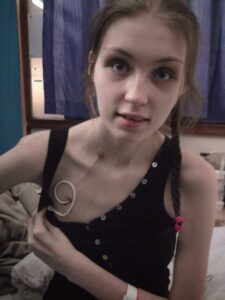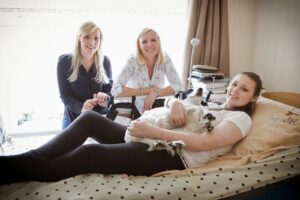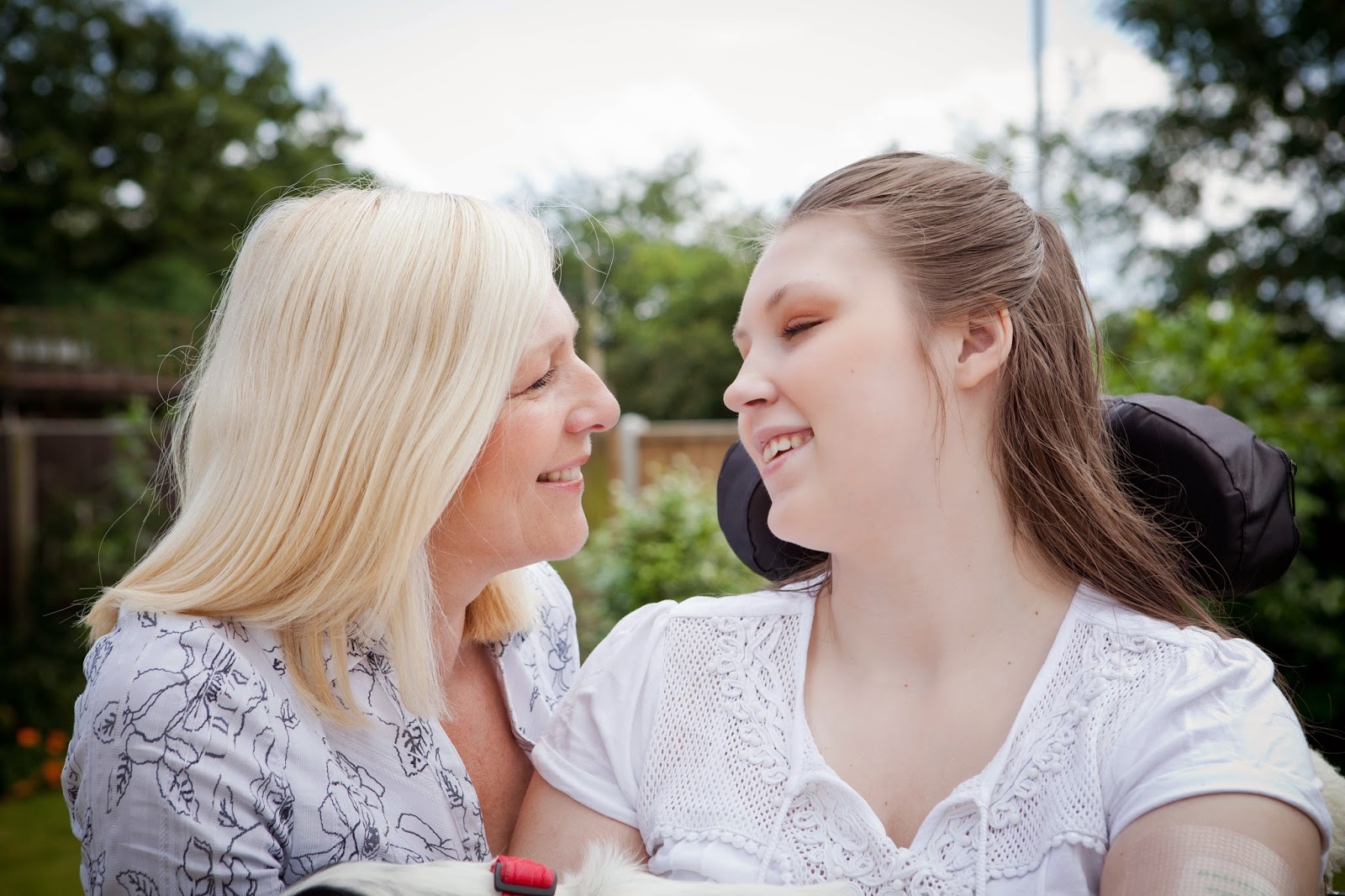“I am a voice for those who don’t have one, and am helping to improve the care of and services for all; but especially the chronically ill, disabled, and life limited. “
An illness doesn’t just affect the individual with the condition – essentially the whole family gets “sick”. Daily life can be far from normal and full of medical procedures, medications and equipment. The care of the individual with the illness can be all-consuming and place huge restrictions on your lives. Then there are the emotions: fear, worry, sadness, anger, frustration, “why us?”, “what if…”, “if only…”, but there is also hope, happiness, joy, and love; unwavering, unimaginable, undeniable love. You come together as a family in a way that allows you to withstand everything that life brings; surviving the bad and celebrating the good. Illness, especially life-limiting/life threatening illnesses, teach you a lot about life, about living, making the most of life and being grateful. You will find strength in places you didn’t expect or know existed. Illness is not all bad, which is something I have learned in the seven years I have been ill.
My name is Lucy and I’m 21. I have a debilitating condition which has caused irreversible intestinal failure and left me fed intravenously, with an array of bags and tubes and in a wheelchair (but mostly bed-bound). My condition, Ehlers-Danlos Syndrome (Hypermobility type) is not normally life-limiting, but in my case it has caused severe life threatening complications which has resulted in me becoming life-limited. My time may be restricted but who knows how long I will live? Very few people do. All we can do is live for the good times and support each other through the bad, to be grateful for each day and make the most of every minute. Life is precious, and we don’t want any time to go to waste.
I became ill aged 14, at a crucial time when girls discover boys, young people start to become more independent and we start to develop a mental plan for how we want our lives to pan out. My teenage years, which were once dominated by horse riding and dog walking (and school, of course) became about medical appointments, physiotherapy, medications and disability equipment. We had to fight for home tuition to continue my education – the one thing I could still do – and we worked hard to try and get me healthy again. Unfortunately, care was not always of the standard it should have been and I was told I was lazy, had a school phobia and that it was “all in my head”. We continued doing all my therapies and taking on board everything that was said, including finally getting my diagnosis of Ehlers-Danlos, but at the same time I continued to deteriorate and lose so many abilities. My gut problems started, my bladder stopped working, I became bed bound and lived with ever-increasing amounts of pain and fatigue. My life was unravelling and I was going through numerous invasive medical tests and procedures, I had a nasal feeding tube and then a permanent gastrostomy tube placed to feed me, I acquired more and more professionals from a range of different specialties and all we could do is trust in the doctors. Gradually we started to develop a great team of doctors who understood my condition and finally I started receiving the right treatment. Unfortunately I was deteriorating quite rapidly, going in and out of hospital, and by the time I was 17 I was completely unable to eat or tolerate feed through my tube, I couldn’t empty my bladder so I had to catheterise and was skeletal – a shadow of my former self. I weighed under 7 stone (I am 6′ 1) and was, quite literally, starving to death. It was thanks to my hospice nurse, who stepped in just in time and begged a consultant at the Royal London Hospital to see me. Even he had to take my mum to one side and explain that I was so weak it may be too late to save me.
I was admitted to hospital and started on Total Parenteral Nutrition (TPN), which is where a sterile mix of nutrients, everything you need (made exactly for your needs), in fluid which is pumped into the bloodstream through a central line, the tip of which sits just inside the heart. I had my Hickman line, a form of central line, placed on the 19th May 2011, having started TPN on the 13th May. It saved my life, and continues to keep me alive to this day. TPN, and the central lines placed to deliver it, come with potentially life threatening complications including line infections, blood clots and liver failure. There are only so many vein sites where the lines can be placed, and I have had 5 lines in the almost 4 years I’ve been on TPN. I have medication through this line too. Over the period of the next 4 years, I had an Ileostomy formed (a stoma bag), a permanent catheter to drain my bladder, then had a Urostomy (a stoma bag for urine) formed in October 2014 – a day after my 21st birthday – and I fell out of bed whilst in hospital and broke my hip in July 2014.

Palliative and hospice care has not only saved my life, but enriched and improved it and has given me quality of life. To me, quality is far more important than quantity. The hospice and palliative consultant stepped in when we desperately needed support, even before I became life-limited. Prior to the support of the hospice and palliative care, so much of my treatment was focused on finding and fixing things that are, realistically, unfixable. They were trying to keep me well in such a way that was sometimes to the detriment of my quality of life. I’m not suggesting the doctors were doing the wrong thing, but my quality of life was not always a key part of my care. When the hospice came on board, followed by the palliative care consultant, my quality of life became the central part of my care. The hospice and a palliative care consultant worked with my team of doctors, especially my main consultant, to improve my quality of life. They helped to sort out appropriate pain relief and anti-sickness medications to get on top of my symptoms and acted as a liaison between my specialists – previously this fell to my mum, who is my main carer (at the time she was still working full time). I was placed at the centre of my care and all aspects of my life were considered. My quality of life was – and is – a priority and my care was more holistic.
Part of being life-limited is thinking about end of life care and death. The common misconception is that palliative/hospice care is only about death and dying, when in fact it is about living well, quality of life and making memories and, as you approach the end of your life, about having a good death. Regardless of health problems, we should all get our wishes down on paper so that plans and provisions are made in the event of an emergency or end of life generally. It can be altered at any time, so you can change it as many times as you like. It will also mean you can talk to your family about your wishes and things like organ donation and what measures you want taken to save your life. However it is crucial when a child or young person has a life-limiting or life threatening condition that the child (and their parent/s should the child be young, the young person being incapable of making decisions or that they would like their parents involvement) have their wishes down on paper in a folder or end of life care plan. This can be discussed with medical professionals and put in your hospital notes. As we are all aware, things can change and turn our world upside down at any time.
As the life-limited child grows up, unless they have a regressive condition or learning disabilities, they will start to understand more about their condition and their care. Until they become an adult, their parents have control over decision making, however as your child ages and depending on their abilities, they may appreciate being involved in the decision making too. They especially need to be encouraged as they prepare for and go through the transition from children’s to adult’s services as, unless parents have legal power of attorney, the young person will be expected to make decisions for themselves. They need to be involved in their care as they will be expected, if mentally capable, to make decisions like an adult. This does not mean parents are no longer needed, I for one want my mum there with me at appointments and meetings to support me in making decisions, but if they are capable they will be expected to make decisions for themselves. To prepare for this, teenagers should be actively encouraged to take an interest in their care.
As a life-limited young adult, I have had to think and talk with my mum about what measures I want taken to save my life and my wishes, even down to my funeral. It’s a difficult conversation for both of us. No parent should face losing their child, and no child’s life should be cut short. That’s not the way it’s supposed to be. I’ve talked to young people who have refused to talk about their death and what they want, and as a result things have happened that would not be what they would have wanted. The hospice helped us to open up and make talking about death okay, and as a result my incredible bond with my mum has deepened another notch. She knows everything I want, and I have all my wishes down in my care plan with the hospice. Broaching a conversation about end of life planning with a child or young person is not always easy – it’s hard for any of us to think and talk about death, but for children and young people it is even harder. Many young people don’t want to think about death, they want to be “normal” like everyone else and do everything their friends and peers do. It will take more than a few short chats for them to fully open up and respond. Just go with the flow, don’t expect too much too soon, and always leave the “door” open so that they know it is okay to talk about it in their own time. As parents you will know your own child so well that it will be easier to judge how much information to give them depending on their age, when they have had enough or when to leave further discussions for another day.
A parent should never have to face losing their child, and I cannot imagine the grief you must feel to lose the most precious thing in the world to you. However, what is often not explored or understood is the grieving that comes with the initial diagnosis of a life-limiting or chronic illness or disability. Both the parents and the child or young person need time to grieve for the life that they thought they were going to lead. There is anticipatory grief: grieving for the loss of your child in advance. The fear of the journey ahead is inconceivable. There is no word for a parent who has lost a child. You’re a widow if you lose your partner, an orphan if you’ve lost a parent, but what do you call a parent who has lost their child? To live with the knowledge that your child will die is horrendous, but for those with life-limiting conditions and complex health needs, parents are often even more scared of their child outliving them. My mum fears losing me, but is also so frightened of dying before me and leaving me. My mum knows how complex my medical needs are and who else would step in to provide care for me 24 hours a day, 365 days of the year with the love and devotion of a parent? This is a constant battle of fears for parents of life-limited and medically complex children. The depth of grief is endless, and there is no right way to grieve.
However, through my illness, this journey is not only one of fear and sadness. Knowing that my life will not be a long one has also made me so aware that I cannot afford to waste any time when I am able to do something. I have met the most amazing people whose paths would not have crossed mine had I been well. I have achieved in many different ways and learnt so much about myself that never would have been discovered. Our house is full of love and laughter because the days when we are together have a new meaning not only to us, but also to our family and our friends. My bond with my sister has taken on a totally different dimension and we have spent time together making memories that are precious to us both. My relationship with my mum was always special, but this has deepened and grown into the most beautiful friendship. Would I give this up to be healthy and have a ‘normal’ life? You bet. But I would truly miss the wonderful things that have happened because I became ill.

(Lucy Watts is a Youth Ambassador at International Children’s Palliative Care Network, Trustee at Pseudo Obstruction Research Trustand Ambassador at Dreams Come True Charity)
Lucy continues to support and advocate for children with life limiting illness through speaking and writing her story. Most recently Lucy was appointed the International Children’s Palliative Care Network’s first Youth Ambassador in February 2015.
To learn more about Lucy’s story, many achievements and advocacy work please visit http://www.lucy-watts.co.uk
& here you can hear Lucy’s story and see how her companion Molly helped bring her back into a community she thought she had lost. https://youtu.be/2S49Ux00U3Q



